Huang Wen-tse (
With the glove puppet film Legend of the Sacred Stone (
"I had been confident all the way that this was going to be a hit," Huang said. "I dare not say this for a regular type of film, but this is a movie of Taiwanese glove puppetry. No one is more professional than me and my family."
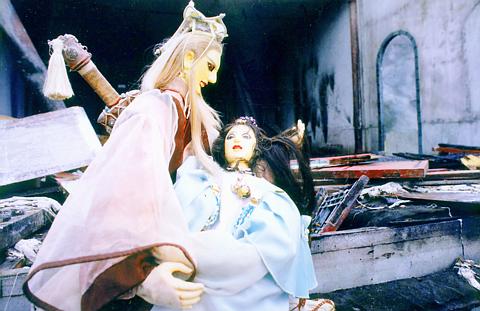
PHOTO: COURTESY DA PILI
But sitting atop Taiwan's commercial film industry isn't enough for the puppet master. He wants to make it big -- Hollywood big.
Bolstered by his tremendous success in Taiwan, Huang is bringing the film across the Pacific in hopes of introducing the unique Taiwanese art form to a broader audience. At least three American film distributors, such as Columbia, have expressed interest in releasing the movie.
"We are making some adjustments to the lines and making voiceovers so the characters would be speaking English," Huang said. "People ask me if I worry about whether Americans will accept the film. ... It's a mystery, so far, whether overseas audiences will receive the movie well, but I won't miss out on this good opportunity to promote (glove puppetry)."
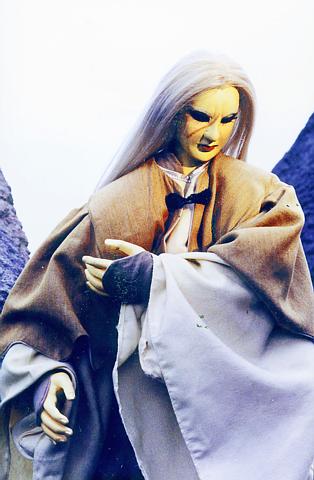
PHOTO: COURTESY DA PILI
If anyone has a chance at making Taiwan's puppets make millions in Tinseltown, it's Huang and his family. From the little town of Huwei in central Taiwan, the Huangs have been working with puppets for four generations. Huang's grandfather, Huang Hai-tai (
Today, Huang's grandfather, now 104 years old, is still an active puppeteer as well as a witness to his grandson's engineering of another wave of glove puppet frenzy. The fans, about 65 percent of them aged between 20 and 35, seem to be a nostalgic generation, looking to return for a while to the time when they were kids who sat glued to the TV as their kung fu fighting heroes meted out punishment and praised moral virtue.
Making changes
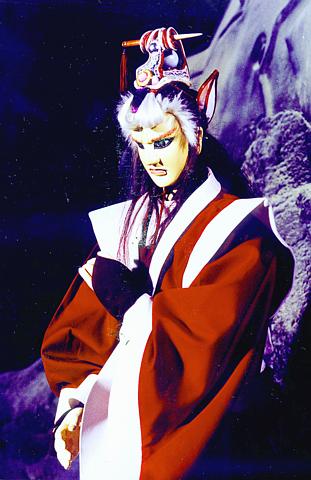
PHOTO: COURTESY DA PILI
For Huang, making the film was the challenge of a lifetime. As a first-time movie director, he took two years to complete the project, spending nearly NT$300 million. Conceptually, the traditional folk art has been enhanced and directed toward a path that exhibits values different from yesteryear.
The once popular TV hero of glove puppetry, Shih Yen-wen (
But these days Shih's heavy-handed moralistic ways might not have gone over as well, so Huang created Su Huan-chen as a new character to carry on the charisma of Shih Yen-wen, but in a somewhat different way.
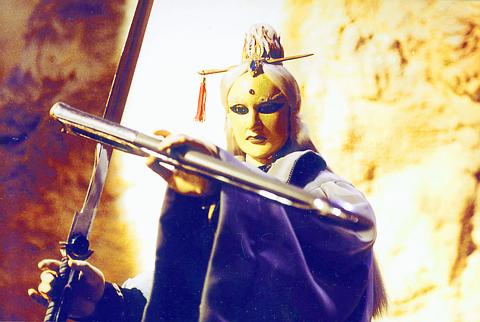
PHOTO: COURTESY DA PILI
"We adjusted the character to fit in with modern society," Huang said. "The puppetry scripts of tradition overtly teach values, such as being loyal to your country and society or being obedient to your parents, but, this time around, we don't want to preach."
The protagonist, Su Huan-chen (
"He lets people accept him gradually. But he fights as well if people try to walk all over him," Huang said. "In the past, the nice people didn't fight back but now it is not realistic to picture such a weak personality to serve as a model for this competitive society."
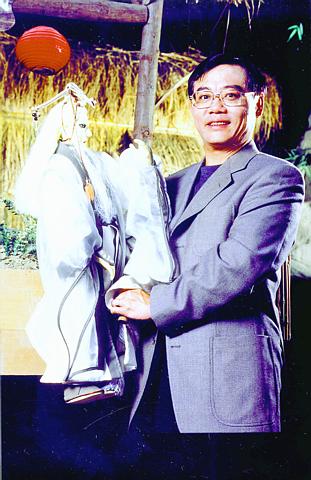
PHOTO: COURTESY DA PILI
Huang's revamping of the glove puppet genre and its subsequent success still haven't resulted in profits at the box office, however. The film has pulled in just over NT$100 million so far, or about 33 percent of its cost. The trip planned for overseas this summer will probably help it break even, but if it doesn't, Huang insists he won't be deterred.
"I did not set out to make profits. If I make money, that's good. If not, it's just a small pity. I want to promote this unique folk art of Taiwanese glove puppetry," he said.
Even if movie-goers don't put Huang in the black, then a secondary market Huang has been able to exploit just might. Chinatrust Commercial Bank is hoping to cash in on the 800,000 estimated glove puppet fans around the country with credit cards featuring Su Huan-chen and other puppet heroes in the Sacred Stone film. Japanese car maker Toyota has also signed on, switching a multi-million dollar advertising campaign from Toy Story 2 to Sacred Stone after market research showed it was a better bet.
These and other associations are part of Huang's strategy to find alternative sources of money for supporting films, a practice well applied in Hollywood but not in Taiwan.
"We elicited prominent businesses to come and ask for cooperation projects and investment possibilities," Huang said. "This has never happened in the history of the Taiwan film industry."
"A lot of people say we have many business groups in Taiwan and why don't they take out money to help with the deplorable movie industry. My thinking is that you have to show what you have before other people believe in you and then investment will roll in," he said.
Adding appeal
Huang seems at ease with the task of trying to translate success at home into success abroad. With recent innovations in glove puppetry, like Pi-li (
Pi-li, or thunderbolt, is the trendy type of glove puppetry that is enhanced by sound and lighting effects. Huang believes Pi-li is one of the reasons that his film is able to compete with Hollywood productions and to attract Western audiences that want excitement and visual effects. It will also appeal more to the younger generation in the US that they are targeting.
"The stage setting of today's so-called pi-li glove puppetry is quite different from the traditional one," Huang said. "The American audience will like the special effects we throw in there."
It is a gamble based on sound advice from his grandfather: innovation will keep glove puppetry alive. What Huang is waiting to see is if innovation will also give it new life in another country. Whatever the result, Huang is already moving ahead with another puppet project -- a film in which he will modernize the appearance of the puppets and set them in a futuristic world.

June 2 to June 8 Taiwan’s woodcutters believe that if they see even one speck of red in their cooked rice, no matter how small, an accident is going to happen. Peng Chin-tian (彭錦田) swears that this has proven to be true at every stop during his decades-long career in the logging industry. Along with mining, timber harvesting was once considered the most dangerous profession in Taiwan. Not only were mishaps common during all stages of processing, it was difficult to transport the injured to get medical treatment. Many died during the arduous journey. Peng recounts some of his accidents in

“Why does Taiwan identity decline?”a group of researchers lead by University of Nevada political scientist Austin Wang (王宏恩) asked in a recent paper. After all, it is not difficult to explain the rise in Taiwanese identity after the early 1990s. But no model predicted its decline during the 2016-2018 period, they say. After testing various alternative explanations, Wang et al argue that the fall-off in Taiwanese identity during that period is related to voter hedging based on the performance of the Democratic Progressive Party (DPP). Since the DPP is perceived as the guardian of Taiwan identity, when it performs well,

A short walk beneath the dense Amazon canopy, the forest abruptly opens up. Fallen logs are rotting, the trees grow sparser and the temperature rises in places sunlight hits the ground. This is what 24 years of severe drought looks like in the world’s largest rainforest. But this patch of degraded forest, about the size of a soccer field, is a scientific experiment. Launched in 2000 by Brazilian and British scientists, Esecaflor — short for “Forest Drought Study Project” in Portuguese — set out to simulate a future in which the changing climate could deplete the Amazon of rainfall. It is

Artifacts found at archeological sites in France and Spain along the Bay of Biscay shoreline show that humans have been crafting tools from whale bones since more than 20,000 years ago, illustrating anew the resourcefulness of prehistoric people. The tools, primarily hunting implements such as projectile points, were fashioned from the bones of at least five species of large whales, the researchers said. Bones from sperm whales were the most abundant, followed by fin whales, gray whales, right or bowhead whales — two species indistinguishable with the analytical method used in the study — and blue whales. With seafaring capabilities by humans